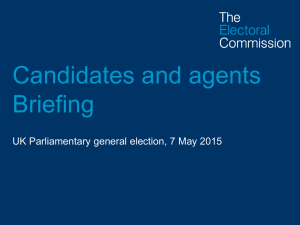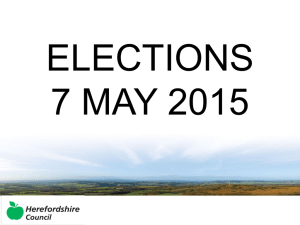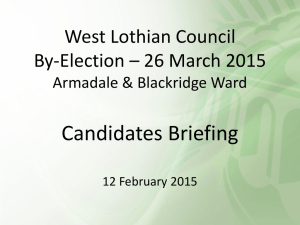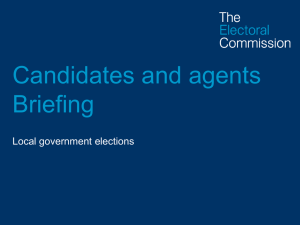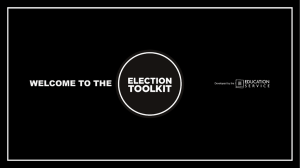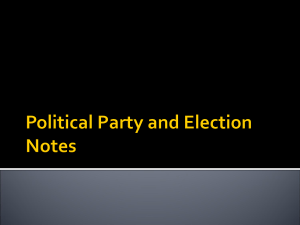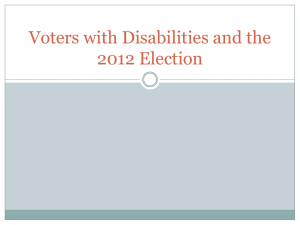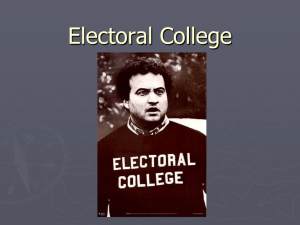Briefing for candidates and agents
advertisement
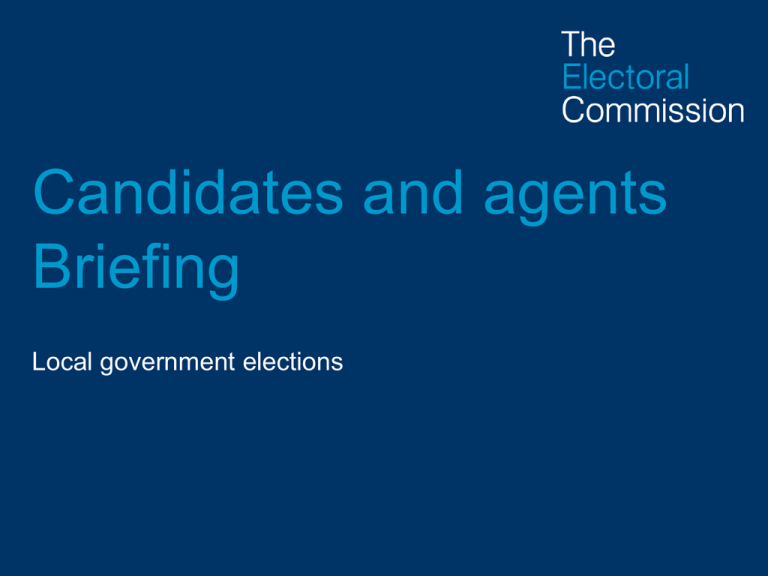
Candidates and agents Briefing Local government elections Topics • • • • • • • • • • • who’s who key dates of the election timetable qualifications disqualifications nominations agents postal votes the poll counting of votes candidates expenses contacts Who’s who • The Returning Officer is the person responsible for running the elections. The Returning Officer is [insert name]. • The Electoral Registration Officer is responsible for maintaining the register of electors and absent voters’ lists. The Electoral Registration Officer is [insert name]. • Contact details are provided later Election Timetable Publication of Notice of Election Not later than [E-25] Nominations commence Close of nominations 4pm – [E-19] Publication of statement of persons nominated 4pm – [E-18] Notification of appointment of election agents 4pm – [E-19] Publication of notice of poll/situation of polling stations [E-6] Deadline for new postal vote applications /changes to existing postal or proxy vote applications 5pm – [E-11] Deadline for applications to register to vote Midnight – [E12] Election timetable (cont’d) Deadline for applications for new proxy votes 5pm – [E-6] Appointment of counting and polling agents [E-5] Polling day [date] – 7am to 10pm Deadline to apply to vote by proxy on grounds of medical emergency or if unexpectedly called away because of employment or service 5pm – polling day Replacement for lost/spoilt postal votes ends 5pm – polling day Alterations to register to correct clerical error 9pm – polling day Return of election expenses + 35 days from result Qualifications • Candidates must satisfy criteria on the day they are nominated and on polling day: – at least 18 years of age – British, qualifying Commonwealth citizen (with indefinite leave to remain), national of an EU member state. • Also at least one of the following: – Registered local govt elector for local authority area – Occupied as owner or tenant any land or premises in the local authority area during the whole 12 months preceding nomination – Principal or only place of work (including unpaid) during last 12 months in local authority area – Lived in the local authority area during the last 12 months Disqualifications • A person cannot be a candidate if they: – are employed by the local authority or hold a paid office under the authority (including joint boards or committees). Candidates may be ‘employed by the local authority’ if they work at certain schools, fire services, police or health services – are subject of a Bankruptcy Restrictions Order (or interim order) in England or Wales – have been sentenced to a term of imprisonment of three months or more (inc. suspended sentence) without option of a fine, during the 5 years before polling day – have been disqualified under Audit Commission Act 1998 – are serving a disqualification due to being found guilty of a corrupt or illegal practice by an election court – hold a politically restricted post Submitting nomination papers • Two nomination papers must be submitted by all candidates by 4pm - [E19] – the nomination form – the consent to nomination • Party candidates will also need to submit, by 4pm – [E-19]: – A certificate authorising the use of a party name/ registered description on the ballot paper – A written request to use one of the party’s emblems on the ballot paper (optional) Submitting nomination papers • Take care when completing your nomination papers, as mistakes may invalidate your nomination. • Complete nomination papers early and arrange for us to provide an informal check • Nomination papers must be delivered in person Nomination form – Include your full name & home address – Optional: use commonly used name box(es) if commonly known by a name other than full name and wish to use it instead. – Description field – 3 options: • leave blank • Independent (and/or Annibynnol in Wales) • party candidates can use party name or description authorised by a certificate issued by or on behalf of the Nominating Officer Nomination form • Subscribers: 10 subscribers are required. • Must sign & print their names. Check details of subscribers against electoral register. • Only ask subscribers to sign after completing the name, address and description fields on the form. Consent to nomination form • Must include: – name and address – which area standing in – confirmation of qualification(s) that apply (at least 1, but select all that apply) – date of birth & signature – witness’ name, address and signature Certificate of authorisation • Party candidates must have written permission to use the party name/description from the Nominating Officer (or a person appointed to act on their behalf) • The certificate may: – allow the use of the party name or a particular description – allow candidate to choose whether to use the party name or any of the descriptions registered with the Electoral Commission • Must be submitted by 4pm [E-19] Emblem request form • Party candidates can ask for an emblem to be printed on the ballot paper • Emblem request form must be submitted by 4pm [E-19] • Party candidates should supply an electronic version of the emblem to the Returning Officer if required Joint candidates • Nominated by more than one party • May use registered joint descriptions – must be supported by certificate of authorisation from each party • May use one emblem of one of the parties but there are no joint emblems Election agent • Responsible for the proper management of your election campaign; particularly its financial management. • Notification of appointment must reach the RO by 4pm - [E-19]. Form is included in nomination pack. • You will become your own agent by default if none is appointed. Other agents • Other agents can be appointed to attend postal vote openings, polling stations and the count on your behalf: – You must give notice in writing of any people appointed as polling and counting agents by [E-5]. – The appointment of postal voting agents attending a particular opening session must be made before the start of the session. We will give 48 hours’ notice. • Access by candidates – once you Access to officially become a candidate: electoral – earliest, on [date of publication of notice of register/absent election] if you, or others declared yourself voting lists a candidate – once you or others have declared yourself a candidate after this date / date you submit your nomination papers • Make written request to the ERO – forms are available from the office / are included in your nomination pack. Access to electoral register / absent voting lists • Only use data for permitted purposes! – to complete the nomination form – to help you campaign – to check that donations/loans are permissible Registration • As a candidate you are uniquely placed to encourage people to register to vote. • You should encourage people to register as soon as possible. • The deadline for applying for the election is [insert date]. • Registration has changed from a household to an individual system. Individuals can now also register online at https://www.gov.uk/register-to-vote. It only takes a few minutes. Registration • When discussing registering to vote with individuals, you will need to make them aware that they will need: – their National Insurance number, – date of birth and address to register. • People who do not have / cannot retrieve their National Insurance Number can still register, but they may need to provide further information. If so, they will be contacted by the ERO. Absent voting • If you are encouraging people who don’t have a postal (or proxy) vote to apply for one, make sure you explain that they will only qualify for one if they are (or will be) individually registered. • They will be registered individually if: – they applied to register after [10 June (E&W) / 19 September (Scotland) 2014], or – were transferred onto the new registers as their details could be matched with official records. They would have received confirmation of this transfer in [insert month]. Campaigning • Do use imprints on all your campaign dos and don’ts material, including websites. • Do comply with planning rules relating to advertising hoardings and large banners. • Do make sure outdoor posters are removed 2 weeks after the election. • Do not produce material that looks like a poll card. • Do not pay people to display your adverts (unless they display adverts as part of their normal business). Code of conduct for campaigners • Campaigners are an essential element of a healthy democracy, but their activities should not bring into question the integrity of the electoral process. • Electoral registration and absent vote applications: – Ensure forms fully confirm to the requirements of electoral law – Include the EROs address for the return of forms – Ensure unaltered applications are sent to ERO within two working days. – Make sure electors understand implications of applying for an absent vote. – Do not encourage postal ballot pack redirection. – Do not encourage electors to appoint a campaigner as proxy. Code of conduct for campaigners • Postal ballot packs: – Never touch a postal ballot paper – Never observe electors completing their postal vote. – Never handle or take any completed ballot paper or postal ballot pack from voters • Campaigning outside polling stations: – You are allowed to put your messages to voters on polling day, including public spaces outside polling places – Keep access to polling places and the pavements around polling places clear to allow voters to enter. Polling day • Polling stations open from 7am to 10pm • Office open [x]am to [x]pm for queries or problems relating to the administration of the election – for queries relating to election finance issues, contact the Electoral Commission (contact details shown later) • Voters in the polling station or in a queue outside the polling station at 10 pm can apply for a ballot paper • Postal votes – can be handed into polling stations within ward/division or delivered to the elections office until 10pm. • A person in a queue at a polling station at 10pm waiting to hand in postal vote can do so after 10pm. Counting of votes • The count will be held in: – [insert count centre location/address] • Count centre will open to candidates agents from [X] • Candidates, election agents, counting agents and one other person appointed by the candidate are entitled to attend. - limits to counting agents: [X] Spending issues Candidate spending • Defined as certain expenses ‘used for the purposes of the candidate’s election’ during the regulated period. • Responsibility of election agent • Limit on expenses: – £740 + 6 pence per elector in ward/division on register in force on [insert date] – reduced for joint candidates • Must get and keep receipts (over £20) Candidates’ spending returns • Returns due 35 calendar days after result of election • Returns made public by Returning Officer • Sample of returns may be reviewed by the Electoral Commission • Failure to submit an expenses return is a criminal offence enforceable by police • No spending will be reimbursed Contacts Contacts • Elections office – [insert] • Highways department – [insert] • Electoral Commission contacts – For questions on the Commission’s guidance on standing for election, contact [insert relevant English or devolved office contact details www.electoralcommission.org.uk/contactus/our-offices] – For questions on election spending, contact 020 7271 0616 Questions Thank you Please ensure you take your candidate’s pack for guidance
